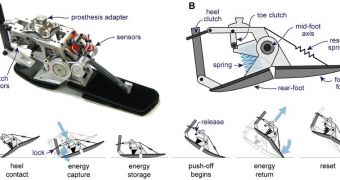Scientists at the University of Michigan departments of Biomedical Engineering and Mechanical Engineering announce the development of a new type of artificial foot that is capable to recycle the energy people exert on the ground while walking. This will allow amputees, for instance, to step a lot easier, and without getting tired so fast. In charge of the recent investigation was expert Art Kuo, who is also a professor in both departments.
“For amputees, what they experience when they're trying to walk normally is what I would experience if I were carrying an extra 30 pounds,” he says. What really sets the new prosthetic device apart from others is that fact that it is able to capture and store the energy that is being exerted by the human foot on the ground in the time between steps, and then release it during the next cycle. This is a mechanisms that is very similar to the one employed by the actual human foot. The innovation was created by Kuo and former UM graduate student Steve Collins, who is now an associate research fellow at Delft University of Technology, in the Netherlands.
“We know there's an energy penalty in using an artificial foot. We're almost cutting that penalty in half. All prosthetic feet store and return energy, but they don't give you a choice about when and how. They just return it whenever they want. This is the first device to release the energy in the right way to supplement push-off, and to do so without an external power source,” Kuo explains. In addition, the new system requires no batteries to do so, such as it is the case with other, larger and more cumbersome push-off mechanisms. The new system uses only a very small, 1-watt battery.
“Individuals with lower limb amputations, such as veterans of the conflicts in Iraq and Afghanistan or patients suffering from diabetes, often find walking a difficult task. Our new design may restore function and reduce effort for these users. With further progress, robotic limbs may yet beat their biological forerunners,” Collins adds. The new study was sponsored by the US National Institutes of Health (NIH) and the Department of Veterans Affairs.

 14 DAY TRIAL //
14 DAY TRIAL //